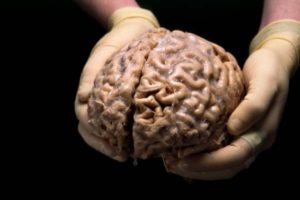20 interesting and fun facts about the brain
 The human brain is a complex organ, and despite the fact that science already knows in general terms how it functions, no one still understands how thoughts, desires and dreams originate in it. But one thing is known for certain: it is the human brain that is the most complex organ of all that we know.
The human brain is a complex organ, and despite the fact that science already knows in general terms how it functions, no one still understands how thoughts, desires and dreams originate in it. But one thing is known for certain: it is the human brain that is the most complex organ of all that we know.
Nerve impulses travel along neurons located in it at a speed of about 440 kilometers per hour.
If you do not sleep for a long time, the temperature of the human brain rises, and our ability to think decreases. Therefore, in order to think soberly and effectively, you need to sleep from time to time.
The human brain continues to develop until it reaches about 25 years of age.
On average, a person uses his brain 90% or a little more. Although there is a common myth claiming about 5-10%, but this is just a myth.
The thinnest threads located in the human brain that conduct nerve impulses between neurons are called axons. There are about 150-160 thousand kilometers in our brain, that is, their total length is approximately four times the length of the earth’s equator.
The size of the brain does not affect the level of intelligence. For example, Einstein’s brain weighed a little over 1200 grams, which is less than average, but he was still a genius.
The human brain has a long-term and short-term memory, and in the latter, information is usually held less than half a minute. Therefore, it is so easy to forget what you thought a couple of minutes ago.
Reflections and mental labor “train” the human brain, as a result of which it begins to work more efficiently.
Neurons in the human brain feed on glial cells, which we have about a trillion each.
The brain cannot exist without oxygen or glucose.
During sleep, the human brain continues to work, and even more intensely than during wakefulness.
The human brain constantly generates an amount of electricity sufficient to make an ordinary electric lamp glow.
Since the human brain has no nerve endings, we would not be able to feel touch to it.
On average, the brain occupies from 90 to 95% of the volume of the human skull.
Cro-Magnon people, primitive people, had a larger brain than modern people.
The fat content in the human brain is higher than in any other organ.
There are about 100 billion neurons in our brain.
On average, an adult has about 2% of body weight in the brain.
The spinal cord of a person is inferior in mass to the brain by about fifty times. In cats and dogs, they weigh about the same, and in some dinosaurs the auxiliary brain weighed more than the main one.
Scientists have long been trying to determine the memory volumes of the human brain, but they are so large that they still have not been able to establish them.



























